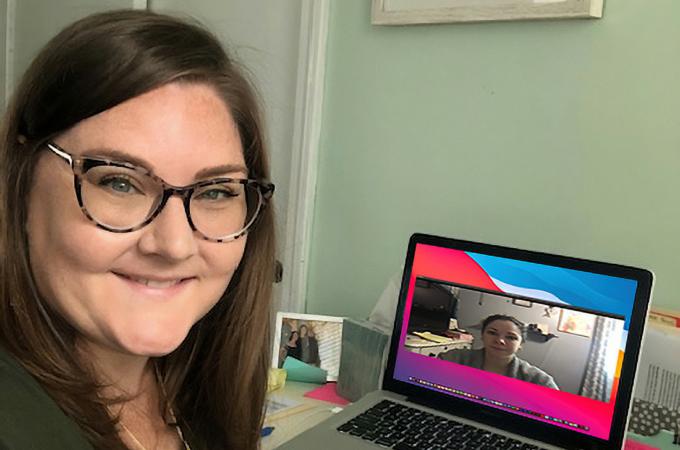Mental Health Awareness Month: Reflecting on a year of pandemic
May is Mental Health Awareness month, an initiative to reinforce the importance of mental health and well-being and reduce the stigma associated with seeking mental health treatment. The health and economic crisis caused by the COVID-19 pandemic has profound mental health challenges for people of all ages. According to the Center for Disease Control and Prevention (CDC), from Aug. 2020 through Feb. 2021, the percentage of adults in the United States with recent symptoms of anxiety or a depressive disorder increased from 36.4 percent to 41.5 percent. Professional mental health counselors play a critical role in providing care and guidance for those struggling with trauma and mental illness.
Catholic Charities of Boston (CCAB) operates a mental health clinic that serves more than 600 adults and children, ages three and up, in Greater Boston. Services include individual, couples, and family therapy, and group work to support those with a wide variety of mental health concerns, including complex trauma, mood disorders, anxiety disorders, developmental delays, and substance use disorder. At the onset of the pandemic in March 2020, all services shifted to telehealth counseling -- either via video or phone call -- and the program continues to operate that way.
Callie Armstrong, LICSW, clinical director of Catholic Charities' Family Counseling and Guidance Center, recently reflected on the challenges of supporting clients through the pandemic and how her team continues to adapt to serve those in need. Amidst the multitude of challenges caused by the pandemic, the number of clients served remains steady, and the clinical team has continued to adapt to meet the demand.
Despite a year filled with uncertainty, the challenges of learning new technology, and limited access to peer support, clinic staff have adapted well to a telehealth format; many have settled into their routines and have found it rewarding.
Callie shares, "Some of our clients have been easier to engage and are more consistent with the new model because fewer barriers stand in the way of their appointments, including travel time, transportation concerns, and increased flexibility in scheduling. On the other hand, the attachment built with the therapist in person is vital to achieving some clients' therapeutic goals. Due to their developmental stages, some of the children we serve are too young to engage in therapy remotely. Ensuring continuity of service and counseling our clients to the best of our ability is a continuous challenge with this remote model. Still, we are happy to be able to continue these essential, sometimes life-saving, services for our clients."
While clients face various mental health challenges during "normal" times, COVID-19 has drastically increased feelings of isolation and anxiety. The Family Counseling and Guidance Center's services are even more vital during these uncertain times, helping clients manage added stress and anxiety.
"It is particularly difficult to monitor clients who are high-risk when you do not have face-to-face contact with them. Being able to see them in the office to assess and monitor is extremely important and something we are hoping to return to soon," Callie explains.
Feelings of isolation from working at home over the last year impact CCAB's clinicians, as well.
Callie shares, "Our staff members miss consulting with colleagues, interacting with peers, and sharing resources. Having the support of your colleagues is very important in a job that concerns high-risk populations with various needs; it is easy to get burnt out and overwhelmed when you are managing others' mental illness and stressors every day."
As we mark Mental Health Awareness month and look forward to a return to some semblance of normalcy, we share some tips from the Family Counseling and Guidance Center's clinicians on managing stress and anxiety:
During uncertain times, it is essential to focus our energy on the things we can control and create structure and routine; identify ways to take care of ourselves and discuss these with therapists or loved ones to hold ourselves accountable. Self-care is critical. It can be as big as taking a day off from work or meeting friends for a walk, or as small as taking a hot shower or sitting in the quiet for five minutes. Pay attention to what your body and mind are telling you, and do things that help you feel in control and more at peace.
Continuity of care for our clients in need is of utmost importance. If you are interested in making a donation or learning more about Catholic Charities of Boston's Family Counseling and Guidance Center, please visit www.ccab.org, or contact Callie at Callie_Armstrong@ccab.org.
JACQUELINE CUNNIFF IS MARKETING COMMUNICATIONS MANAGER FOR CATHOLIC CHARITIES OF BOSTON.



















